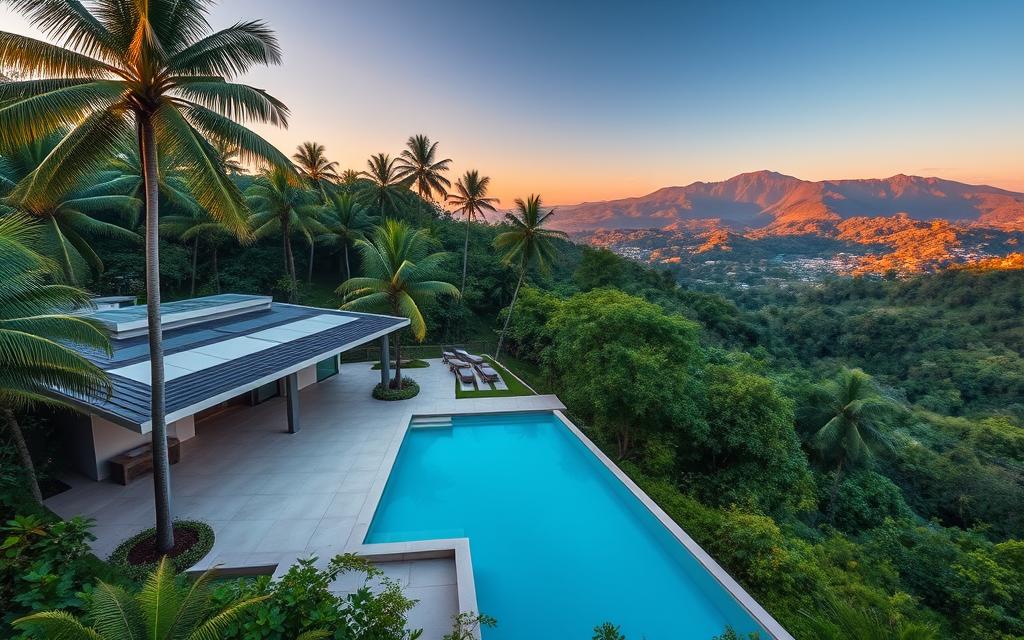Foreign Property Ownership for Costa Rica Residents | JAROS C.R


Did you know that over 70% of buyers in Costa Rica come from abroad? This stunning country offers a unique blend of natural beauty and stable investment opportunities.
With its democratic stability and welcoming policies, this Central American gem provides equal rights to all buyers. The only exceptions are restricted maritime zones, which require special permissions.
We've helped countless clients navigate the exciting world of tropical real estate. From beachfront villas to mountain retreats, the options are as diverse as the landscape itself.
Before making any decisions, it's crucial to understand residency pathways, legal processes, and tax obligations. Our team at JARO brings 25+ years of local expertise to guide you through every step.
Ready to explore your options? Learn more about investment opportunities or contact our specialists today.
Why Costa Rica is a Top Destination for Expats and Investors

Over 30% of global relocation seekers consider this nation their top choice for a new beginning. From lush rainforests to world-class healthcare, the country offers a rare mix of adventure and security. Its 6.3% GDP growth (OECD 2023) and #1 Latin American healthcare system (WHO) make it ideal for long-term plans.
Natural Beauty and Quality of Life
With 25% of its land protected, the country boasts 28 national parks and 800 miles of coastline. Cloud forests, beaches, and tropical microclimates cater to every preference. Many expats find their dream homes here, thanks to the year-round spring-like weather.
The 94% renewable energy grid supports eco-conscious living. Add the low crime rates and "Pura Vida" philosophy, and it’s no surprise it ranks #2 for global retirement (Expat Insider 2023).
Stable Economy and Welcoming Culture
Over 100 multinational corporations have Central American HQs here, fueling job growth. Tourism incentives like Law 6990 attract investment in hotels and vacation homes. Locals embrace newcomers, making cultural integration smoother than in many countries.
Whether you seek a retirement haven or a rental property, the blend of stability and natural wealth is unmatched. Ready to explore your options? Our team simplifies every step.
Residency Options for Foreign Property Buyers
Understanding residency options helps investors maximize their benefits in this tropical paradise. While ownership doesn’t require residency, securing status can offer tax advantages and long-term stability.
Rentista Residency: Stable Income Requirements
The Rentista program suits those with guaranteed income. Applicants must show $2,500 monthly for two years (2023 adjustment). This status prohibits local employment but allows family reunification.
Investor Residency: Business and Real Estate Pathways
Investors can qualify by committing $150,000 in tourism projects or $500,000 in other ventures. Real estate purchases count toward these thresholds. Recent reforms cut processing times by 40%.
Permanent Residency: Long-Term Benefits
After three years with temporary status, applicants can fast-track to permanent residency. This grants access to healthcare and Social Security agreements with 14 countries. Tax residency kicks in after 183 days annually.
We simplify this process with bundled residency-property services. From document prep to tax planning, our team ensures a smooth transition.
Understanding Foreign Property Ownership Rights in Costa Rica

Costa Rica's legal framework ensures equal rights for all buyers, regardless of origin. The constitution (Article 19) grants the same protections to foreigners as locals, including fee simple titles—equivalent to U.S. standards. Recent Supreme Court rulings (2022 precedents) reinforce these rights, even in disputed cases.
Equal Rights for Foreigners and Locals
Investors enjoy full ownership privileges, from resale to inheritance. The Notary College oversees transactions, ensuring transparency. Title insurance from providers like Stewart Title adds extra security.
Corporations (S.A./S.R.L.) offer workarounds for complex purchases. Grandfathered titles in areas like Los Sueños bypass typical restrictions. For residency benefits, property investments can fast-track eligibility.
Exceptions in Maritime Zones
The first 200 meters of coastline have special rules. Public access covers 50 meters; the remaining 150 meters require concessions. ZM Law Article 31 conflicts with constitutional rights here, creating unique hurdles.
Infrastructure projects may trigger expropriation risks. Due diligence is critical, especially with the dual-registration system (Registro Publico vs. Catastro). Squatter claims under adverse possession laws expire after 10 years.
Step-by-Step Guide to Buying Property in Costa Rica
Navigating the real estate market in this tropical haven requires a clear roadmap. We break down the process into four manageable steps to ensure a smooth transaction. With the right team, you can avoid common pitfalls and secure your dream home confidently.
Partner with a Local Real Estate Agent
A seasoned agent understands local trends and hidden gems. They streamline the search, negotiate deals, and connect you with trusted attorneys. Buyers benefit from insider knowledge of zoning laws and pricing benchmarks.
Secure a Bilingual Attorney-Notary
An attorney handles legal checks and paperwork. They verify titles through Registro Publico and ensure compliance with Law 7495 for surveys. Stewart Title escrow services add an extra layer of security.
Conduct Due Diligence
Title searches and topographic surveys are non-negotiable. PropData’s verification services help uncover liens or disputes. BAC International Bank’s escrow protocols protect deposits during this phase.
Negotiate and Sign the Purchase Agreement
Standard deposits are 10%, with penalties for withdrawal. Bilingual notaries (1-1.5% fee) finalize the escritura. Include contingencies for title defects to safeguard your investment.
Closing typically takes 30-60 days. Remote buyers can use power of attorney. Wire transfers avoid Central Bank holds, reducing delays. Follow these steps, and you’ll join the 98% of buyers with clean titles.
Key Legal Documents and Closing Process
Closing on a home requires gathering specific legal documents and understanding associated costs. We guide clients through this final phase to ensure all requirements are met efficiently. Proper preparation prevents delays and protects your investment.
Required Documents for a Smooth Transaction
The escritura pública serves as the official deed and requires notarization. Our team verifies its alignment with the Catastro plot map to prevent boundary disputes. Recent updates mandate digital submissions through the National Registry platform.
Valid municipal tax receipts prove all payments are current. The Colegio de Abogados provides lien searches for additional security. These documents typically take 15-30 days to process during peak seasons.
Understanding Notary Fees and Transfer Taxes
Standard closing costs average 3.6% of the declared value. This includes the 1.5% property transfer tax and 0.5% title registration fee. Notary charges range from 1-1.5% based on transaction complexity.
Luxury properties may incur additional sliding scale taxes from 0.15% to 0.55%. Documentary stamps add approximately 0.63% in administrative fees. Residency applicants should factor these into their investment calculations.
Our document preparation services handle these requirements in three tiers: basic review, full processing, and premium concierge. This ensures every client receives support matching their needs and timeline.
Taxes and Fees for Foreign Property Owners
Smart investors always analyze fiscal obligations before signing contracts. Understanding these costs ensures smooth transactions and long-term savings.
Property Transfer Tax (1.5%)
The standard transfer tax applies to the registered fiscal value, often lower than market rates. Notaries calculate this during closing, typically adding 1.5% to total costs.
Declarations for Bienes Inmuebles must be filed by January 31st annually. Late submissions incur penalties up to 5% of the assessed value.
Annual Property Tax (0.25%) and Luxury Tax
Base rates start at 0.25% for most homes. Properties valued above $234,000 face progressive luxury taxes—0.55% for high-end residences.
Owners enjoy capital gains exemptions after five years of holding. Corporate structures may reduce liabilities through deductible expenses like maintenance.
Rental income deductions include mortgage interest and management fees. Note that property services carry a 15% VAT. Non-residents should review inheritance rules and tax benefits for residents under double taxation treaties.
Our team optimizes portfolios through tailored consultations, ensuring compliance while maximizing returns.
Special Considerations for Coastal and Maritime Zone Properties
Coastal areas in this tropical paradise come with unique legal nuances every buyer should know. Unlike inland parcels, oceanfront land falls under strict maritime zone laws designed to balance private use with public access.
Restrictions on the First 200 Meters
ZM Law Article 57 divides coastal areas into two zones. The first 50 meters are public domain, while the next 150 meters require concessions. A 2024 Golfito Municipality case reinforced enforcement, annulling 132 non-compliant concessions.
Key rules include:
- Public access easements must remain unobstructed.
- ICT-approved Plan Regulador dictates construction limits.
- Sea turtle nesting areas ban development entirely.
Concession Land: Risks and Limitations
Concessions grant temporary rights, typically for 20 years. Renewals aren’t guaranteed and face bureaucratic hurdles. Foreigners often partner with locals due to 51% ownership mandates.
Recent reforms prohibit bearer shares for concessions. Environmental impact statements add costs and delays. Our compliance audits help clients navigate these complexities safely.
Exceptions like Los Sueños offer titled beachfront parcels—rare opportunities with fewer restrictions. For most, concessions remain the only path to coastal living.
Common Risks and How to Mitigate Them
Investing in land comes with unique challenges that require proactive solutions. While the market offers incredible opportunities, understanding potential pitfalls ensures smoother transactions.
Squatters and Title Disputes
Adverse possession laws allow squatters to claim rights after 10 years of occupation. Preemptive measures like boundary markers and regular inspections deter unauthorized use.
Title disputes often arise from outdated registries. PropData’s verification services uncover hidden liens, while title insurance covers legal fees for resolution. In a 2023 Tamarindo case, swift litigation removed squatters in under 90 days.
Expropriation and Zoning Changes
Infrastructure projects may trigger land seizures, but fair compensation precedents exist. Zoning reforms can alter building rights overnight, though appeals are possible within 30 days of notification.
Our risk assessment matrix evaluates environmental compliance and registry alerts. For post-residency steps, these safeguards ensure lasting asset protection.
Why Los Sueños and Tamarindo Are Prime Investment Locations
Los Sueños and Tamarindo stand out as top-tier destinations for savvy investors seeking coastal living. These areas offer rare combinations of luxury amenities and strong appreciation potential, backed by solid infrastructure.
Titled Beachfront Properties in Los Sueños
Only 5% of coastal areas offer titled homes, and Los Sueños leads this exclusive category. The marina accommodates 200+ luxury yachts, while PGA-level golf courses enhance property values.
HRG Hardy listings show consistent 6-8% annual appreciation. Gated communities here set security benchmarks with 24/7 patrols and biometric access.
Infrastructure and Expat Communities
Tamarindo's recent upgrades include expanded surfing infrastructure and new medical facilities with English-speaking staff. The town's international school serves growing expat families.
Rental yields reach 5-8% net returns according to AIRDNA data. Our pre-vetted portfolio focuses on properties with highest occupancy rates.
2024 projections indicate 7% price growth in both locations. Whether seeking vacation homes or income properties, these areas deliver unmatched advantages.
Conclusion: Navigating Your Costa Rican Property Journey
Building wealth in paradise starts with informed decisions. Whether pursuing residency or pure investment, legal and tax compliance ensures long-term success.
Market opportunities evolve quickly. Avoid unverified "experts"—our team has closed 300+ transactions with full transparency. This tropical haven rewards strategic planning.
Let us guide you through the process seamlessly. Legal experts at JARO provide free consultations to start your journey today.
Contact us via phone, email, or website. Download our checklist to simplify every step. Welcome to your new world—Pura Vida style!

